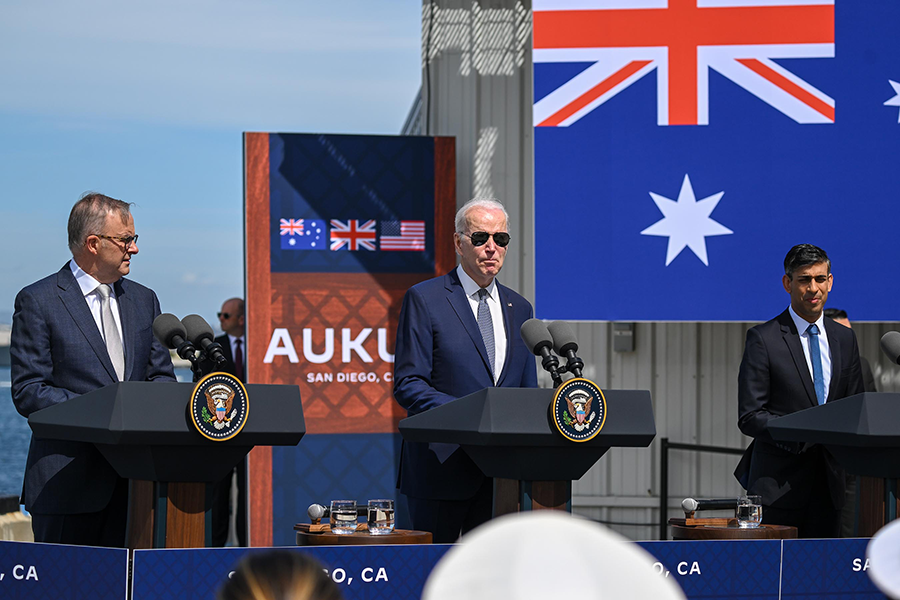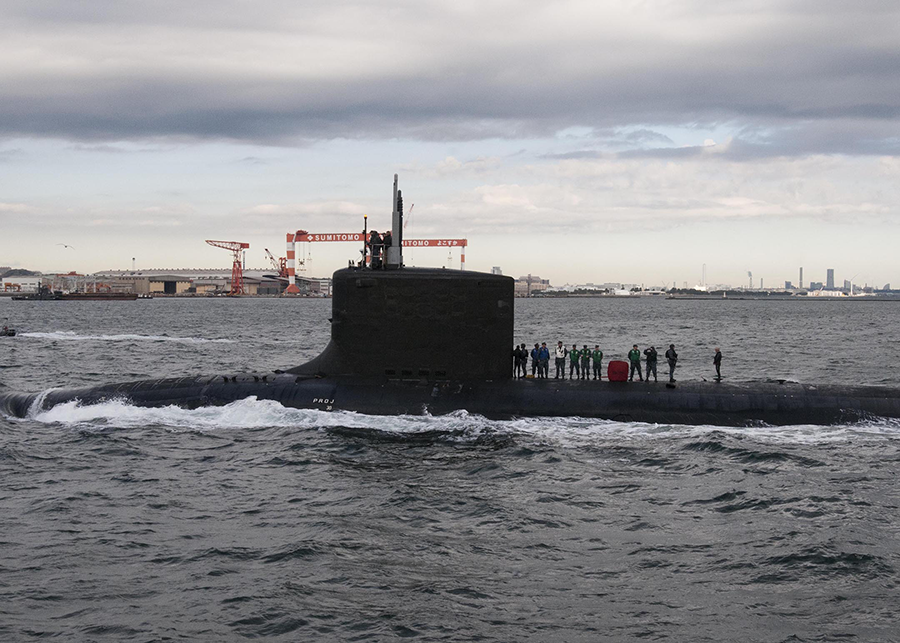"No one can solve this problem alone, but together we can change things for the better."
AUKUS Plans Announced
April 2023
By Kelsey Davenport
The leaders of Australia, the United Kingdom, and the United States announced plans for Australia to purchase at least three nuclear-powered submarines from the United States and work with the UK on a new submarine design to meet Australian security needs.
 The March 13 announcement by Australian Prime Minister Anthony Albanese, U.S. President Joseph Biden, and UK Prime Minister Rishi Sunak comes 18 months after London and Washington revealed their intentions to provide Canberra with nuclear-powered submarines under the terms of the so-called AUKUS deal. (See ACT, October 2021.)
The March 13 announcement by Australian Prime Minister Anthony Albanese, U.S. President Joseph Biden, and UK Prime Minister Rishi Sunak comes 18 months after London and Washington revealed their intentions to provide Canberra with nuclear-powered submarines under the terms of the so-called AUKUS deal. (See ACT, October 2021.)
After meeting with Albanese and Sunak in San Diego, Biden said the “overriding objective” of the AUKUS initiative is to “enhance stability in the Indo-Pacific amid rapidly shifting global dynamics.” Albanese described the initiative as the “biggest single investment in Australia’s defense capability” and said it will strengthen “national security and stability in our region.”
According to a fact sheet released by the three countries, Australia will purchase three U.S. Virginia-class nuclear-powered attack submarines beginning in 2030s, with congressional approval, to meet its defense requirements while it works with the UK on a new submarine design and builds up its industrial base for domestic production. Prior to that, Australian naval personnel will train with the U.S. Navy and the Royal Navy. Beginning in 2027, both countries will forward-deploy nuclear submarines to Australian bases.
The new class of Australian-UK submarine, referenced as the SSN AUKUS, will incorporate U.S. components. Prior to this agreement, the United States had shared technology pertaining to nuclear submarine development only with the UK. The first of the SSN AUKUS submarines will be built in the UK and delivered to Australia in the late 2030s. Australia will aim to build up its capacity to produce SSN AUKUS submarines domestically by the 2040s. The submarines built in Australia will receive nuclear power reactor units that are welded shut, making it more difficult for the weapons-grade fuel to be removed, according to the fact sheet.
Although all three leaders reiterated their commitments to preventing the spread of nuclear weapons, the decision to provide Australia with submarine reactors fueled by weapons-grade uranium and to jointly develop SSN AUKUS-class submarines raises concerns about proliferation and the precedent this deal will set.
Australia, as a non-nuclear-weapon state-party to the nuclear Nonproliferation Treaty (NPT), is prohibited from developing nuclear weapons. But Australia can possess weapons-grade materials. Under Article 14 of a country’s NPT-required comprehensive safeguards agreement with the International Atomic Energy Agency (IAEA), a country can remove nuclear materials from a  safeguarded, peaceful program for military purposes that do not involve the development of nuclear weapons, such as naval propulsion.
safeguarded, peaceful program for military purposes that do not involve the development of nuclear weapons, such as naval propulsion.
In a March 14 letter, Australia notified IAEA Director-General Rafael Mariano Grossi of its intent to “commence negotiation” on an arrangement pursuant to Article 14. The letter said it was Australia’s intent to “include a robust package of safeguards and verification measures” that will enable the IAEA to confirm the “non-diversion of nuclear material, the non-misuse of nuclear facilities, and the absence of undeclared nuclear activities.”
Biden and Albanese also reiterated their commitments to maintaining nonproliferation standards. Biden said the deal sets the “highest standards” for verification and transparency with the IAEA.
But there is no precedent for a state utilizing Article 14 for naval propulsion and how a state must “make it clear” that the material removed from safeguards will not be used for weapons purposes.
In a March 14 statement, Grossi said he would “ensure a transparent process” and that the agency must “ensure that no proliferation risks emanate from this project.” He said the Article 14 agreement will be submitted to the IAEA Board of Governors “for appropriate action.”
Other states, most notably China, have objected to the AUKUS deal on nonproliferation grounds. Although there are legitimate proliferation concerns, Beijing’s mixed record on supporting nonproliferation objectives raises questions about the sincerity of its opposition.
In a March 14 press conference, Chinese Foreign Ministry spokesman Wang Wenbin said the decision will “exacerbate” the arms race, “undermine the international nuclear nonproliferation regime,” and destabilize the region. He said the three AUKUS countries are motivated by “geopolitical interests” and are going down the “wrong and dangerous path.”
He said this arrangement “violates the purpose and object of the NPT” and the safeguards implications affect all IAEA members. He said the AUKUS deal should not proceed until IAEA member states reach consensus regarding the safeguards issues.
The next day, Wang said there is no way to effectively safeguard the nuclear material and ensure it will not be diverted to build nuclear weapons. He also said there are differences over how to interpret Article 14 of a safeguards agreement. It remains unclear whether the Biden administration has the support in Congress to push through the AUKUS deal, which has bipartisan critics.
In a December letter to Biden, Senate Armed Services Committee Chairman Jack Reed (D-R.I.) and ranking member Sen. James Inhofe (R-Okla.) raised concerns about the capacity of the United States to sell submarines to Australia and still meet U.S. security needs. They warned about “stressing the U.S. submarine industrial base to the breaking point.” They urged Biden to ensure that “sovereign U.S. national security capabilities will not be diminished” because of the AUKUS deal.
But Rep. Joe Courtney (D-Conn.), founder of the bipartisan AUKUS Congressional Working Group, described the March 13 announcement as a “seminal moment” and said it “lays out a clear path” to enhance the Australian Navy and achieve U.S. national security goals in the Indo-Pacific region.
Australia also faces domestic criticism that could challenge the AUKUS project. Former Prime Minister Paul Keating who, like Albanese is in the Labor party, described it as the “worst deal in all history” and argued that Australia was overreacting to the threat posed by China.
Former Prime Minister Malcom Turnbull from the opposition Liberal Party welcomed the announcement of U.S. and UK submarines rotating through the country, but said Australia would have been better off to continue working with France to buy cheaper nuclear submarines that use low-enriched uranium, which cannot be used for weapons. Paris was taken by surprise with the AUKUS announcement in September 2021.
